What can and cannot be washed in the dishwasher: features of washing dishes made from different materials
Household appliances for washing dirty dishes are increasingly found in domestic kitchens.Having a dishwasher greatly simplifies life for home owners, allowing them to free themselves from the routine at the kitchen sink.
However, not everything can be put into an automatic dishwasher for washing. There are a lot of materials, kitchen utensils made of which should be kept away from this unit. We'll tell you what you can't wash in the dishwasher and what you can.
The content of the article:
Dishwasher conditions
In a home kitchen, you have to constantly wash not only dishes and cutlery, but also a variety of cooking utensils. Forks, spoons, plates, glasses, cups, knives, cutting boards, pots, pans, etc. There is a huge amount of kitchen “equipment” in the arsenal of any housewife. And all this gets dirty regularly and requires washing.
To understand what should not be put into the PMM, you just need to imagine the conditions inside this technique after turning it on. To wash kitchen utensils in the dishwasher, fairly aggressive cleaning chemicals are used together with hot water. Not every material can withstand this without serious negative consequences.
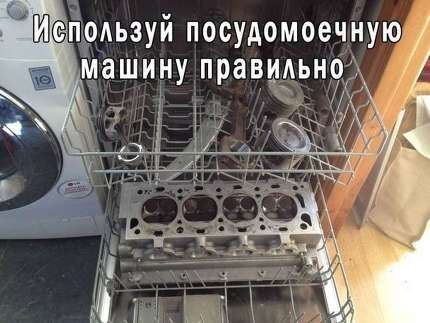
In general, the dishes placed inside the PMM are affected by four factors:
- Aggressive detergents.
- Water with temperatures up to +50-750WITH.
- Prolonged exposure to moisture (under some modes, the “wetting-washing-rinsing” cycle can last up to 4 hours).
- Hot air drying.
Utensils washed in an automatic dishwasher should easily withstand the effects of all these factors. Some materials are not afraid of high temperatures, but household chemicals are harmful to them.
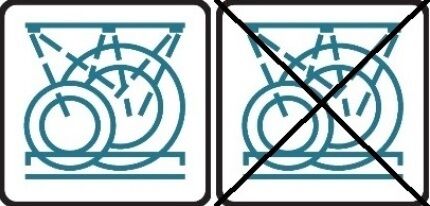
Others simply swell from prolonged exposure to water. Everything must be taken into account what happens inside the PMM complete with cutlery.
On top of that, in any kitchen there is a lot of old cutlery that did not have such marks in the first place. In Soviet times, no one even thought about the need for such markings.
PMMs were then used only in large canteens. And there they knew which dishes should be washed from food residues in an automatic dishwasher and which should not.
What is allowed to be washed in PMM?
There are many cutlery items that can withstand washing in the dishwasher. Most dishes and cooking utensils can be washed in the dishwasher without restrictions. How to download correctly kitchen utensils in the machine hopper, you will learn from our recommended article.
Pots, pans and many tableware items are made from materials that are designed to withstand high temperatures and moisture without harmful consequences.
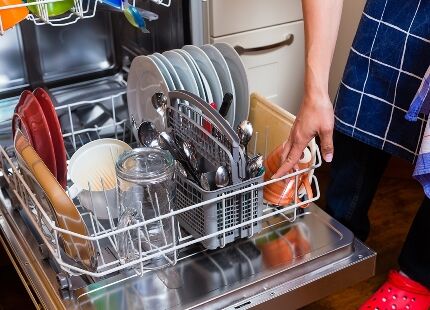
The following items can be washed in the dishwasher without restrictions:
- food grade plastic and heat-resistant silicone;
- of stainless steel;
- cupronickel;
- ordinary and heat-resistant glass;
- ceramics (except for items with a pattern drawn on top of the fired surface);
- metals coated with enamel.
The hardest thing is with plastic items. Plastic is not just one material, but a whole group with different characteristics and properties. Some of them can be sent to PMM for washing, while others absolutely cannot. The main point here is the melting point of a particular type of plastic.
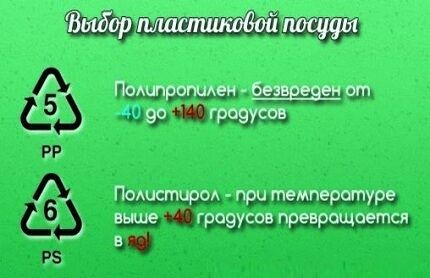
Plastic dishes can only be washed in an automatic dishwasher if they are reusable. Under no circumstances should disposable cups and plastic plates be placed in the PMM. Such items are made from cheap plastics that are not designed for long-term or even short-term exposure to hot water or steam.
The most trouble-free material is stainless steel. Dishes and utensils made from it are not afraid of prolonged exposure to moisture, temperatures of 60–750C and household chemicals. The situation is similar with cupronickel. This copper alloy even begins to shine after washing in heated water.
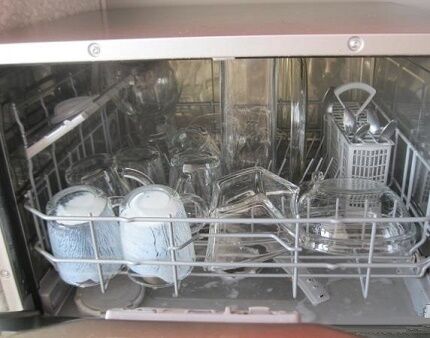
Glassware, especially if it is specifically designed for cooking on the stove, also easily tolerates washing in the dishwasher.Sudden temperature changes are dangerous for ordinary glass, but in PMM, cold water from the tap is not used during rinsing.
It is still slightly heated by the heating element. So problems and destructive consequences in the form of cracks should not arise.
Ceramics can be washed in the dishwasher, but only those that do not have patterns on the surface. Images drawn on top of fired ceramics in PMM will certainly crack. In this case, fallen pieces can harm the machine itself by clogging its filters. The same goes for porcelain.
Porcelain cups and plates can be placed in the PMM for automatic washing. However, you need to make sure that the design on them is under the glaze. If the pattern is applied on top (an extreme rarity for porcelain, but it also happens), then it is better to wash such dishes by hand. It's important to choose processing cycle and set the washing temperature lower – up to +500WITH.
Hotter water will not harm such cutlery. However, with sudden temperature changes they can crack. In general, for glass, ceramics and porcelain, the PMM settings usually have a special mode with “delicate” machine operating parameters.
Stop list for dishwashers
Regardless of the material, it is prohibited to wash dishes or any items with stickers in the dishwasher. These pieces of paper will definitely “peel off” from the surface being cleaned and end up in the filters.
The consequences are predictable - the PMM will most likely break immediately. It’s good if the automatic safety system works, otherwise you’ll have to call a specialist to repair the equipment or send it for service.
Aluminum and silver products
Hot water in PMM aluminum and silver is not dangerous. However, used when washing household chemicals extremely harmful to them.After being in the dishwasher, utensils made from these metals begin to darken and become coated.
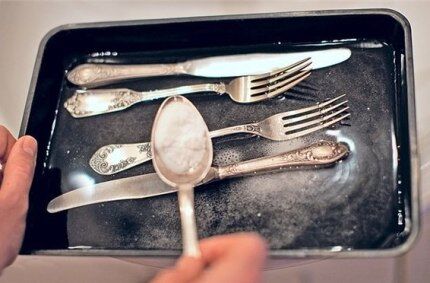
Aluminum releases ions during prolonged interaction with water. If you put a lot of aluminum cookware in the dishwasher for two to three hours at the same time, then everything inside will be “painted” with a corresponding metallic coating.
Moreover, aluminum will not only cover the internal walls of the PMM, but can also clog the nozzles on the sprinklers. Breakdown and subsequent dishwasher repair in this case is inevitable.
A video with visual explanations of why you can’t wash aluminum kitchen utensils in a PMM:
Wooden and cast iron objects
Wood and water are not very compatible materials. It is better to wash wooden spatulas, cutting boards and rolling pins yourself. They in PMM will first swell from excess moisture, and then shrink under the influence of high-temperature air drying.
The result will be cracked utensils, unsuitable for further use for their intended purpose. Nowadays, many wooden cutting boards are made not from a single piece of wood, but from glued pieces. If such a prefabricated product is kept in water for a long time, it may fall apart into individual elements.
And even if it doesn’t fall apart, it will definitely come apart in the glued areas. In this case, the consequences are even worse - the glue from the board will subsequently enter the body with food.
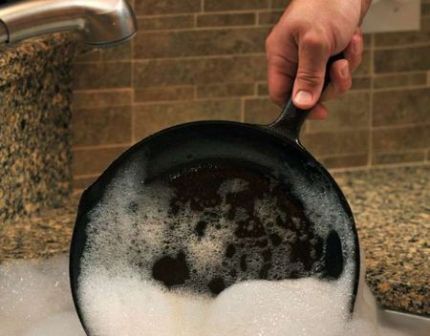
Cast iron frying pans, cauldrons and kettles become covered with a thin film of fat over time.It protects this metal from water and oxygen, which prevents the formation of rust on such utensils.
With manual washing, greasy deposits are never completely washed away, but with automatic washing with a large amount of detergent, it disappears. And then the unprotected cast iron begins to rust.
Knives, strainers and garlic presses
Knives made of stainless steel become slightly dull after a long stay in the dishwasher. That is, the material itself is not afraid of PMM. However, the knife will have to be sharpened again after such a wash.
This also applies to graters and any other utensils with a sharp edge for cutting food. They can not only become dull, but also scratch the internal walls and mechanisms of the washing machine.
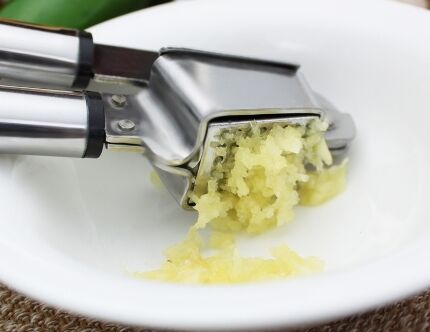
Strainers, graters, vegetable cutters and devices for cutting food into shapes will have to be washed by hand. They have a lot of small nicks and grooves, where particles of vegetables, fruits, meat, etc. remain after cooking. The jets sprayed by the nozzles in dishwashing equipment are not able to wash away such “crumbs”. They can only be cleaned manually.
It is also not recommended to put knives and other parts of the meat grinder in the dishwasher. On the one hand, the cutting edges will become dull, and on the other, the metal from which this machine is made will oxidize. Then you will have to clean the blackened surfaces with abrasive powders by hand.
Thermos and crystal products
Often thermoses are designed in such a way that the flask is wrapped in heat-insulating material. However, when wet, thermal insulation not only loses its properties, but also deteriorates.Plus the effect of chemicals from “soap” with unclear consequences. Even after complete drying, the insulation will not retain heat as well as before.
The thermos should be washed exclusively by hand. You cannot place it in water or steam for a long time. Moreover, it is not recommended to do this, even if it does not have a heat insulator.
There is always empty space between the outer casing and the bulb. If you do not disassemble it, the water that gets there will not dry completely. And the result is an unpleasant musty amber.
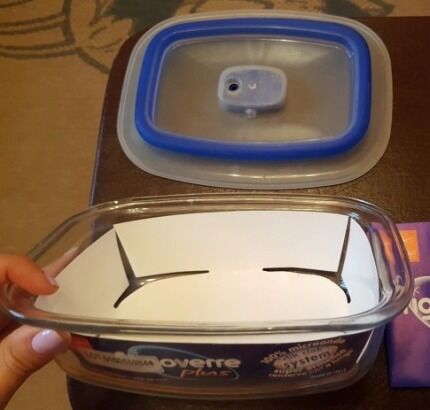
Some crystal items can be washed in the dishwasher. However, not all: there are many different types of crystal, and most of them have temperatures above +500C are contraindicated. The consequences of such heating are microcracks inside the crystal glass. For crystal products, expensive PMMs have special programs.
It is allowed to place crystal dishes in cheap dishwashers only if this is permitted by the manufacturer of such dishes. The packaging of this product must clearly indicate “allowed.”
If you don’t have a box for a crystal vase at hand, then it’s not worth the risk. Crystal may crack or become dull and cloudy when heated. But it’s more beautiful after washing in a machine with by specialized means he definitely won't.
Once again about inappropriate use
The main thing that absolutely cannot be washed in a PMM is utensils made of aluminum, copper, tin, cast iron, wood and some types of plastic. The rest is permitted without restrictions or with certain reservations.
The dishwasher has several operating modes with different water temperatures. For example, thin glass and porcelain are best washed at “delicate” settings +40–500C. It’s not worth the risk of washing them at higher temperatures. They may also crack.
It is not recommended to wash clay pots without glaze in PMM. They will not crack, but will gradually become saturated with substances from washing tablets and liquids. With further use, moisture will come out of the porous clay, and the chemicals will remain inside. The consequences in the form of an unpleasant odor are unlikely to please anyone.
The dishwasher is a great place to sanitize dish sponges. Hot water not only cleans kitchen accessories, but also rids them of germs.
Will familiarize you in detail with the operating rules of the dishwasher next article, which is worth reading for both future and “present” owners of useful and convenient household appliances.
Conclusions and useful video on the topic
The following selection of videos will help you understand all the nuances of what is and is not allowed to be put in an automatic dishwasher for washing.
Once again about the prohibited use of the dishwasher:
A dishwasher is a very necessary and easy-to-use appliance in the kitchen. But not all types of dishes can be washed in it. There are a number of materials for which such washing is contraindicated. You need to be careful not to spoil the cutlery or break the dishwasher.
Tell us about what and how you load into the dishwasher. Share your secrets of operating this type of household appliance. Please leave comments in the block below, ask questions and post photos on the topic of the article.
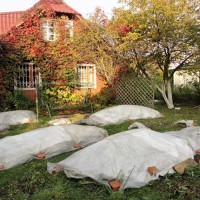
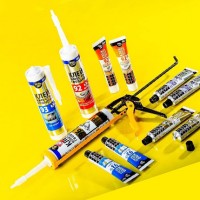

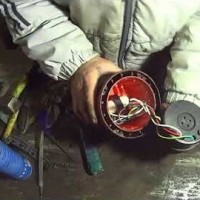
Yes, when I bought a dishwasher I couldn’t think that it couldn’t wash such a large number of items. To the list of prohibitions listed here, it is worth adding that you cannot wash cracked or stuck together dishes in the dishwasher. So your favorite mug with a crack will have to be washed by hand. Also, of course, you cannot wash elegant wine glasses and glasses.
You are right, fine glassware and porcelain cannot be washed in the dishwasher. But you can do the following:
- carefully arrange the dishes so that they stand as tightly as possible and do not move;
— pour a suitable product into the rinsing compartment (there are special ones for glass);
— no need to use powder or tablets!
— start the “Rinse” or “Soak” mode for up to 15 minutes.
As a result, the dishes will become clean and shiny.
I only try to wash plates, forks, spoons, cups and some pots in the dishwasher. And all this must be compactly placed in it. I wash wooden boards, spoons, turners, as well as plastic spoons and cast iron frying pans only by hand. Personally, a dishwasher makes my life much easier, since washing dishes no longer takes up my time.